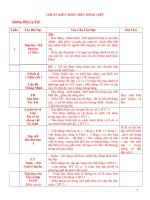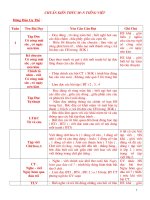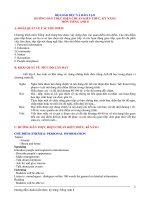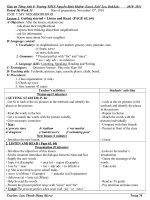CHUAN KTKN TIENG ANH 9
Bạn đang xem bản rút gọn của tài liệu. Xem và tải ngay bản đầy đủ của tài liệu tại đây (127.51 KB, 3 trang )
<span class='text_page_counter'>(1)</span><div class='page_container' data-page=1>
<b>Chuẩn Kiến thức và Kỹ năng môn Tiếng Anh LỚP 9</b>
<b>Themes / Topics</b> <b>Attainment targets</b> <b>Language focus*</b>
<b>1. Personal information</b>
- Friends
- Clothing
- Home village
<b>Speaking</b>
- Make and respond to introductions
- Ask and respond to questions on
personal preferences
- Ask for and give information
about the geography
of one’s home country
- Talk about a picnic in the country
- Describe directions / locations
<b>Listening</b>
Listen to a monologue or a
dialogue of 100-120 words for
general or specific information
<b>Reading</b>
Read a dialogue or a passage of
150-180 words for general or
specific information
<b>Writing</b>
- Write an argument letter with a
frame using suggested ideas or
word cues
- Write an exposition of 80-100
words from picture and word cues
<b>Grammar:</b>
- Tenses: past simple, past simple
with wish, present perfect
- Used to
- The passive
- Prepositions of time
- Adverb clauses of result
<b>Vocabulary:</b>
- Words to describe the geography of
a country: climate, population,
religions, languages, social customs,
habits
- Words about clothing: types/ styles,
colours,
fashions, material, designs
- Words to describe the country/ a trip
to the
country: natural landscapes,
location, direction, outing activities
<b>2. Education</b>
- Learning a foreign
language
<b>Speaking</b>
- Ask for and give information about
language study /
language courses
- Express opinions / preferences
- Talk about methods of study
<b>Listening</b>
Listen to monologues or dialogues
within 100-120 words for general or
specific information
<b>Reading</b>
Read a dialogue or a passage of
150-180 words for general or
specific information
<b>Writing</b>
Write a letter of enquiry within
80-100 words following a model and an
outline given
<b>Grammar:</b>
- Direct and reported speech
- Reported questions, here and now
words with
reported speech
- Modal verbs with <i>if</i>
<b>Vocabulary:</b>
- Words to describe school
settings, study
courses, school life
- Words to talk about language study:
timetables, courses, subjects, ways of
learning, learning activities
<b>3. Community</b>
<i>- </i>The media
<b>Speaking</b>
- Ask for and give opinions
- Express agreement and
disagreement
- Talk about the development and
the use of the media, especially the
Internet
<b>Listening</b>
Listen to a monologue or a
dialogue of 100-120 words for
<b>Grammar:</b>
- Tag questions
- Gerunds after some verbs: <i>like, </i>
<i>love, enjoy, dislike, hate, …</i>
<b>Vocabulary:</b>
- Words to talk about the media:
history,
</div>
<span class='text_page_counter'>(2)</span><div class='page_container' data-page=2>
general or specific information
<b>Reading</b>
Read a dialogue or a passage of
150-180 words for general or
specific information
<b>Writing</b>
Write to express opinions based on
a model and guidelines given within
80-100 words
advantages, disadvantages
<b>4. Heath</b>
- Healthy
environment
- Saving energy
<b>Speaking</b>
- Ask for and give reasons
- Persuade
- Show concern
- Make and respond to suggestions
- Talk about the problems of
environment pollution
and solutions to the problems
- Talk about the problems of energy
waste and solutions to the problems
<b>Listening</b>
Listen to a monologue or a
dialogue of 100-120 words for
general or specific information
<b>Reading</b>
Read a dialogue or a passage of
150-180 words for general or
specific information
<b>Writing</b>
- Write a letter of complaint of
80-100 words using frame and idea
cues
-Write a speech of 80-100 words
based on suggested frame and idea
cues
<b>Grammar:</b>
- Conditional sentences: type 1
- Adjective + that clause
- Adverb clauses of reason: <i>as, </i>
<i>because</i>
- Connectives: and, but, because, or,
<i>so, </i>
<i> therefore, however</i>
- Phrasal verbs
<i>- Suggest + verb-ing</i>
<i>- Suggest (that)+ </i>subject<i> + should</i>
<b>Vocabulary:</b>
- Words to talk about the
environment around students' life:
problems, conservation activities,
solutions, activities to protect the
environment
- Words to talk about energy waste
problems around students’life and
solutions to save energy
<b>5. Recreation</b>
- Celebrations
<b>Speaking</b>
- Give and respond to compliments
- Describe events
- Talk about popular celebrations in
Viet Nam and in
other countries
- Express opinions on different
events
<b>Listening</b>
Listen to a monologue / dialogue of
100-120 words for general or
specific information
<b>Reading</b>
Read a dialogue or a passage of
150-180 words for general or
specific information
<b>Writing</b>
Write a letter to a pen pal within
80-100 words based on a suggested
outline and ideas cues
<b>Grammar:</b>
- Adverb clauses of concession:
<i>although / though</i>
- Relative pronouns and relative
clauses (defining and non-defining)
<b>Vocabulary:</b>
- Words to describe popular
celebrations in different countries:
<i>Tet, Easter, Christmas, Mid-Autumn </i>
<i>Festival, Wedding, Passover, </i>
<i>Father’s Day, …</i>
- Words to express compliments,
feelings and opinions on related topics
</div>
<span class='text_page_counter'>(3)</span><div class='page_container' data-page=3>
- Natural disasters
- Life on other planets - Make predictions- Talk about the weather forecast
- Describe events
- Talk about assumptions
- Talk about possibility
- Name and describe natural
disasters
<b>Listening</b>
Listen to a monologue or dialogue
of 100-120 words for general or
specific information
<b>Reading</b>
Read a dialogue or a passage of
150-180 words for general or
specific information
<b>Writing</b>
- Write a story of 80-100 words
based on picture / word cues or
prompts
- Write an exposition of 80-100
words based on pictures / word
cues or prompts<i> </i>
- Relative pronouns
- Relative clauses (defining and
non-defining)
- Modal: may / might
<i>-</i> Conditional sentences: type 1
and type 2
<b>Vocabulary:</b>
- Words to talk about natural
disasters: <i>earthquakes, tidal </i>
<i>waves, typhoons, volcanoes, </i>
<i>tornadoes, snow storms, …</i>
- Words to talk about the weather
forecast and preparations for
natural disasters
- Words to talk about life on other
planets
</div>
<!--links-->









